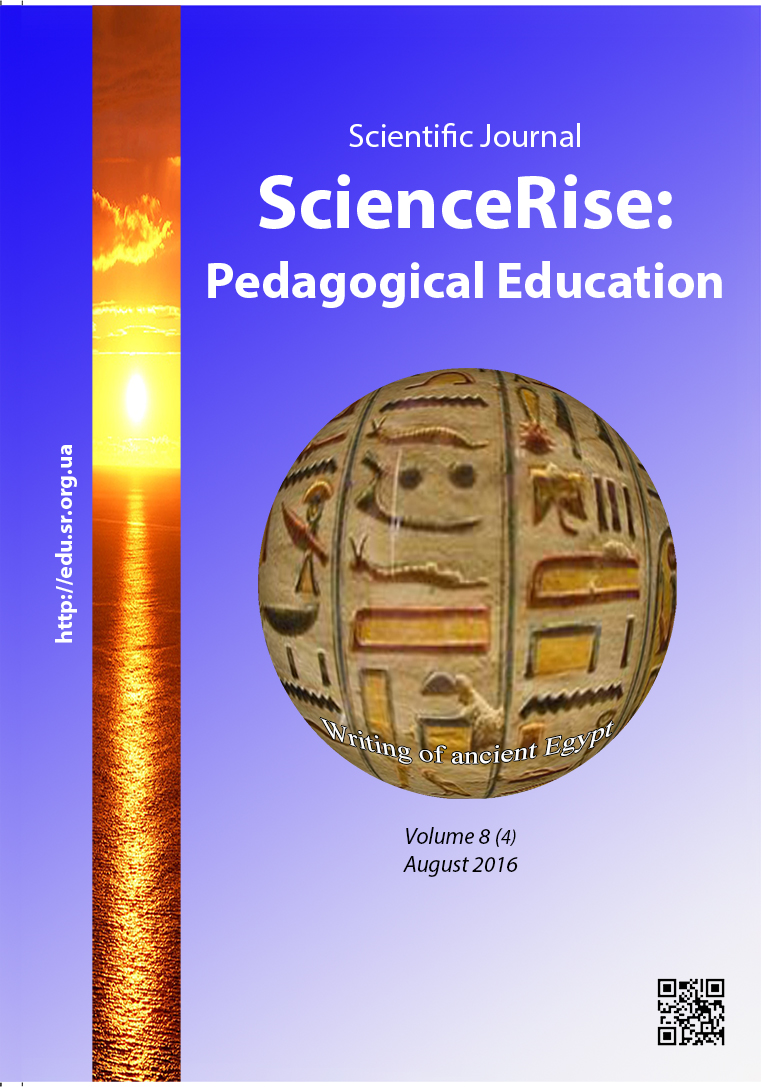The significance and role of active teaching methods on the practical trainings in higher school
DOI:
https://doi.org/10.15587/2519-4984.2016.76231Keywords:
active methods, practical training, case-methods, business game, brain stormAbstract
There were studied the active methods of teaching at the practical trainings at higher school. It was established, that the methods of active study significantly improve memorization of material, favor its identification and purposeful practical realization. There are determined the active teaching methods, namely: imitating: non-playing (brain storm, analysis of legal industrial situations, solution of conflicts, execution of creative tasks), playing (press-conferences, business and role games, trainings, brain-rings, court) and non-imitating (problem lectures, seminars, discourses, debates, graduate work, industrial practice). There were established the features of the active teaching methods. The use of playing teaching methods (press-conferences, business and role games, trainings, brain-rings, court) allows determine the state of psychological climate of the separate student and group in whole; study in the small group and with small group; create conditions for the creative activity; learn to be responsible, independent, reasonably individualistic; elaborate the skill to make managerial decisions; learn the improvisation under conditions of deficit of time and information; get used to the different situations and role positions; learn to analyze and find the way out of problem situations. There were established the features of use of certain forms of discussion such as the “three of decisions”, structured debates. There was analyzed the methodology of conducting the business games and case-methods that belong to the imitating methods of the role study and activate the process of mastering knowledge, abilities and skills, teach to act in the different roles, make managerial decisions, experiment with the different styles of relations between partners, allow quickly master the information, favor the mastering of methods of making decisions in short term. Case-methods and business games have not only diagnostic, cognitive function, but also the training one. In the case of performing roles students, who perform them, make their own decisions and in this process can be seen the directionality on formation of the skills of professional behavior in collective, ability to analyze the character of interpersonal relations
References
- Petruk, V. A. (2006). Teoretiko-metodichni zasady formuvanna profesiinoi kompetentnosti maibutnih fahivciv tehnichnuh specialnostei u procesi vuvchenna fundamentalnuh disciplin [Theoretical and methodological bases of formation of professional competence of future professionals technical skills in the study of fundamental disciplines]. Vinnyca: Universum-Vinnyca, 292.
- Lapuzina, O. M. (2006). Formuvannya profesiinoi etiki maibutnih insheneriv na osnovi situaciinogo navchanna [Formation of professional ethics in future engineers based situational learning]. Vinnica, 20.
- Samugina, S. I. (Ed.) (1998). Pedagogika i psihologiya vusshei shkoly [Pedagogy and psychology of higher education]. Rostov-na-Dony: Feniks, 526.
- Smolkin, A. M. (1991). Metody aktivnogo obucheniya [Methods of active learning]. Moscow: High school, 176.
- Evtuh, M. B. (2002). Suchasni tendencii profesiinoi pidgotovki vchitela [Modern trends in teacher training]. Psycho- pedagogical foundations humanization of the educational process in schools and universities, 3, 170–175.
- Hlebnikova, T. M. (2003). Dilova gra yak metod aktivnogo navchanna pedagoga [Role play as method of active learning teacher]. Kharkiv: Оsnova, 80.
- Suvorova, N. (2000). Interaktivnoe obuchenie: novye podhody [Online training: new approaches]. Teacher, 1, 25.
- Romanova, I. A. (2001). Rol aktivnyh metodov navchanna u formuvanni pravovoi svidomosti studentiv [The role of active learning methods in shaping legal consciousness of students]. Kyiv: Naukovyi svit, 309–314.
- Innovation Through Cooperation (1997). WACRA, 735.
- Aktivnye metody I formy obycheniya [Active methods and forms of education] (1989). Minsk, 73.
Downloads
Published
How to Cite
Issue
Section
License
Copyright (c) 2016 Ірина Анатоліївна Огороднійчук

This work is licensed under a Creative Commons Attribution 4.0 International License.
Our journal abides by the Creative Commons CC BY copyright rights and permissions for open access journals.
Authors, who are published in this journal, agree to the following conditions:
1. The authors reserve the right to authorship of the work and pass the first publication right of this work to the journal under the terms of a Creative Commons CC BY, which allows others to freely distribute the published research with the obligatory reference to the authors of the original work and the first publication of the work in this journal.
2. The authors have the right to conclude separate supplement agreements that relate to non-exclusive work distribution in the form in which it has been published by the journal (for example, to upload the work to the online storage of the journal or publish it as part of a monograph), provided that the reference to the first publication of the work in this journal is included.








